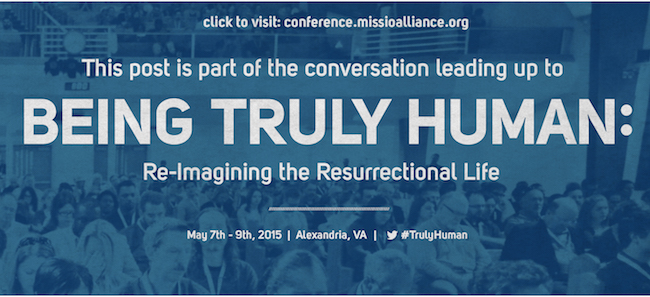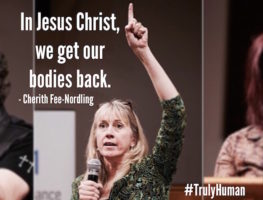The most transformative and important moment of my life began on my knees, next to my bed. I was 15 years old and I had an inexplicable ache to know God. I had just spent an entire evening reading the gospel of Luke alone in my bedroom. When I finished reading, I was overwhelmed with joy and gratitude for the compassion, love, and grace exemplified in Jesus. At once, everything started to make sense. That night I fell to my knees, raised my hands in the air, and wept with tears of joy. The only words that I could say for the next hour were, "Thank you, Jesus; thank you, Jesus; thank you, Jesus…" Grace, love, and hope had found me.
I was saved.
If you are reading this, more than likely you can point to a pivotal moment a your life similar to mine, or maybe you can point to several gradual moments. Many of us who grew up in any evangelical tradition have heard the phrase, “I am a sinner saved by grace” at some point or another. In my own theological tradition, someone in the congregation would bellow out a long and loud “AMEN!” in response to that proclamation. Yes, we are indeed “sinners saved by grace!” But as you have seen through some recent blog posts, Missio Alliance has made the provocative claim that “The cross is not enough!” If this is true, which I believe it is true, then is it enough to say that we are “sinners saved by grace”?
To answer this question, I would like to take us through a good ol’ fashion Bible study by looking at a few verses in the book of 1 Peter.[1] If I were to have this conversation with the Apostle Peter, I wonder if he would be puzzled by our view of salvation as being a one-time-past-event. In Peter’s letter, the word salvation, or soteria, is used several times and can be defined as rescue or deliverance. But what does the Apostle Peter mean when he uses this word?
The book of 1 Peter is addressed to foreigners or scattered Christians who now have what we call a dual-citizenship. They are citizens of the actual land in which they live, and more importantly, they are citizens of the Kingdom of God. The recipients of Peter’s letter knew very well that the death, resurrection, and ascension of Jesus had ushered in the Kingdom of God; and now, they believed, the parousia was at hand. Peter wrote with rock solid confidence that God’s purposes of rescuing the world was in effect and would soon come to completion.
In the opening of the letter, Peter reminds his readers that this hope, that will never spoil or fade, is kept in heaven until the coming of their salvation which will be revealed in the last time.
…and into an inheritance that can never perish, spoil or fade. This inheritance is kept in heaven for you, who through faith are shielded by God’s power until the coming of the salvation that is ready to be revealed in the last time. (1 Peter 1:4-6)
Salvation in this passage is not a one-time-past-event, but it is a present and future hope. This future hope that is “kept in heaven for us” is so much more than “going to heaven when you die.” Instead, this is God’s future inheritance that will be fulfilled here on earth when God “puts the world to right."[2] In other words, Peter talks about salvation in the context of a future consummation.
And again in 1 Peter 1:9, Peter reminds the readers that they have much reason for an inexpressible and glorious joy.
Though you have not seen him, you love him; and even though you do not see him now, you believe in him and are filled with an inexpressible and glorious joy, 9 for you are receiving the end result of your faith, the salvation of your souls. (1 Peter 1:8-9)
Because of the faithfulness of Jesus and the work of the Spirit, they may now receive the salvation of their souls. Salvation, written in the future tense, is a hope in both the present and the future that new life has come and is presently birthed within us. This new life within us is analogous to the new life that raised Jesus from the dead. It is exactly as N.T. Wright often says, “what God did for Jesus at Easter he does and will do for us in the depth of our being.” Salvation is an eschatological-happening that began in the faithfulness of Jesus. This eschatological-salvation lives in us now, and will continue to live in us until the day of completion when the world is put to right in the New Heaven and New Earth.
In 1 Peter 2:2, Peter urges the readers to “crave pure spiritual milk “so that by it they may “grow up in salvation.”
Therefore, rid yourselves of all malice and all deceit, hypocrisy, envy, and slander of every kind. 2 Like newborn babies, crave pure spiritual milk, so that by it you may grow up in your salvation, 3 now that you have tasted that the Lord is good. (1 Peter 2:1-3)
Here again, salvation is a future-hope; but Peter now calls the believer to respond in the present. As Christ followers, salvation should be a daily, eschatological-happening.
In the process of salvation, there is Movement, Electricity, and Power that is beyond a simple-one-time-prayer.
We should be captivated by it, transformed by it, rinsed by it, and given a new sense of meaning from this eschatological-happening.
We are called to live with reckless abandon in a life lived toward the Divine, in the power of the Spirit, as we bear God’s image in this world. This is made possible by the faithfulness of King Jesus who is not only divine, but also flesh. Who we are, the Son became; who He is in His humanity, we are becoming.
This, my friends, is the process of becoming Truly Human.
—
[1] Some of my ideas from this essay were developed as a student of Dr. Scot McKnight in his class “Letters to the Early Churches” at Northern Theological Seminary. Dr. McKnight helped the students see that salvation in the book of 1 Peter is primarily future-oriented. Therefore, Dr. McKnight said in class, “the full presence of God in Christ should begin to glow in our bodies…”
[2] “Put the world to right” is a phrase often used by N.T. Wright in which I have become very fond of which will happen through God’s “rescue operation.” The rescue operation is God’s sovereign plan of saving the world through God’s original promises made with Abraham, played out through Israel, fulfilled in King Jesus and will have a future consummation with the advent of the New Heaven and New Earth. There will be no more tears, pain, death, debt, hurt, murder, death, hatred, sin, and on. What an amazing hope we can have!










Missio Alliance Comment Policy
The Missio Alliance Writing Collectives exist as a ministry of writing to resource theological practitioners for mission. From our Leading Voices to our regular Writing Team and those invited to publish with us as Community Voices, we are creating a space for thoughtful engagement of critical issues and questions facing the North American Church in God’s mission. This sort of thoughtful engagement is something that we seek to engender not only in our publishing, but in conversations that unfold as a result in the comment section of our articles.
Unfortunately, because of the relational distance introduced by online communication, “thoughtful engagement” and “comment sections” seldom go hand in hand. At the same time, censorship of comments by those who disagree with points made by authors, whose anger or limited perspective taints their words, or who simply feel the need to express their own opinion on a topic without any meaningful engagement with the article or comment in question can mask an important window into the true state of Christian discourse. As such, Missio Alliance sets forth the following suggestions for those who wish to engage in conversation around our writing:
1. Seek to understand the author’s intent.
If you disagree with something the an author said, consider framing your response as, “I hear you as saying _________. Am I understanding you correctly? If so, here’s why I disagree. _____________.
2. Seek to make your own voice heard.
We deeply desire and value the voice and perspective of our readers. However you may react to an article we publish or a fellow commenter, we encourage you to set forth that reaction is the most constructive way possible. Use your voice and perspective to move conversation forward rather than shut it down.
3. Share your story.
One of our favorite tenants is that “an enemy is someone whose story we haven’t heard.” Very often disagreements and rants are the result of people talking past rather than to one another. Everyone’s perspective is intimately bound up with their own stories – their contexts and experiences. We encourage you to couch your comments in whatever aspect of your own story might help others understand where you are coming from.
In view of those suggestions for shaping conversation on our site and in an effort to curate a hospitable space of open conversation, Missio Alliance may delete comments and/or ban users who show no regard for constructive engagement, especially those whose comments are easily construed as trolling, threatening, or abusive.